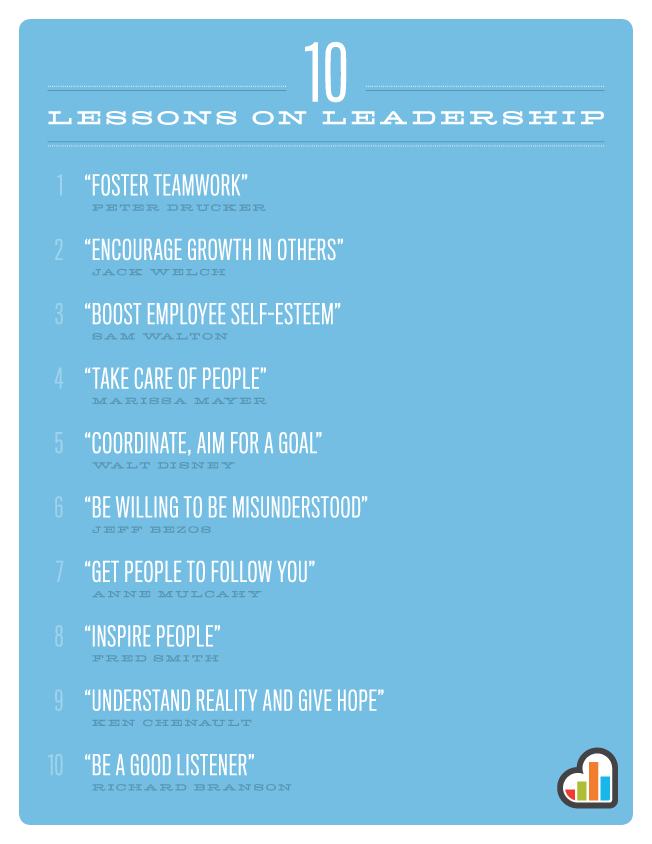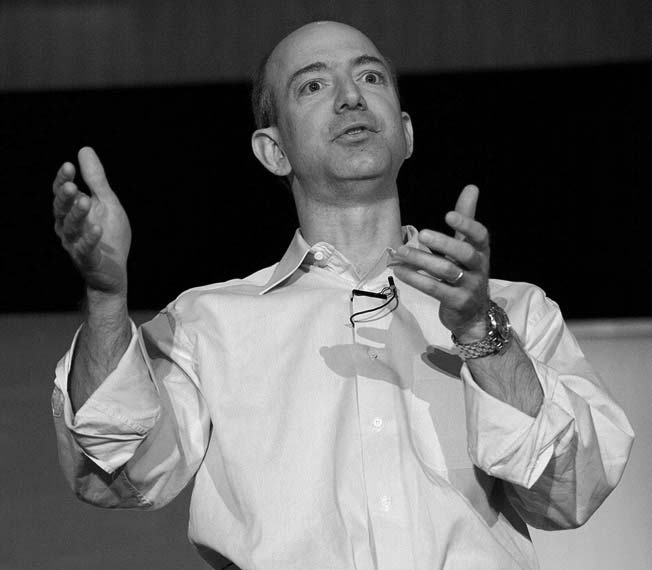Leadership is a lifelong learning process. Every great leader always looks for ways to improve. No one ever wakes up and says, “I know everything there is to know about leadership. I’m a perfect leader.”
Leadership can be especially challenging for entrepreneurs. Balancing the need to run a business (i.e., products, investors, customers, etc.) and the need to lead company personnel is quite a task.
In this post, we’ve included 10 quotes from some of the very best business men and women. Our graphic, called a shareable, summarizes each quote in a few words. Feel free to share this graphic on your website using our HTML code.
Here are the full quotes:
1. Foster Teamwork
“The leaders who work most effectively, it seems to me, never say ‘I.’ And that’s not because they have trained themselves not to say ‘I.’ They don’t think ‘I.’ They think ‘we’; they think ‘team.’ They understand their job to be to make the team function. They accept responsibility and don’t sidestep it, but ‘we’ gets the credit. This is what creates trust, what enables you to get the task done.”
Peter Drucker, Management Consultant
Drucker makes an interesting point when he says that leaders don’t train themselves not to say “I.” He’s implying that leaders innately work with others and let the team get the credit. They don’t force themselves to say “we.” “We” is natural for them, and it’s the way they’ve always thought.
It’s been said by many people, including a few U.S. presidents and theologian Benjamin Jowett that:
“There is no limit to what a man can do or where he can go if he doesn’t mind who gets the credit.”
It can be toxic for an organization to have an “employee of the month” or a “who gets credit for what” attitude. You work as a team when you don’t care who gets the credit.
So the next time you see someone with a resume that states, “I accomplished x” or “I did x,” it should send up a few warning signals.
2. Encourage Growth in Others
“Great leaders love to see people grow. The day you are afraid of them being better than you is the day you fail as a leader.”
Jack Welch, Former Chairman and CEO of General Electric
Another similar quote from Welch:
“Before you are a leader, success is all about growing yourself. When you become a leader, success is all about growing others.”
Some companies follow the motto: “hire for character, train for skill.” You hire people that are eager to learn and are very “raw.” They don’t have a ton of skills; but as a leader, you teach them, and they become better. They grow with your company and contribute to its success.
You see this with football coaches. In football coaching, it’s almost unheard of for someone with no experience to be hired as the head coach of a team. Most people start in a low level position (i.e., video coordinator, quality control assistant, scout, etc.) and gradually move up if they become successful in their roles. Sometimes it takes more than thirty years before they finally get a chance to be the head coach.
The same can occur in business. George Bodenheimer is the former president of ESPN. He started out working in the mailroom of ESPN. It would have been very difficult for him to rise to the presidency if he hadn’t had a boss who wanted to help him grow and succeed in the company.
If you’re a leader, you should heed Welch’s advice and help your employees grow. If you don’t want them to grow, preferring that they stay in their current positions, then, in Welch’s mind, you’re failing as a leader. You might have a great employee waiting to be a star, but if you don’t help them grow, you’ll never see it. Worse, they might leave the company to go to an employer who will help them grow.
Employees are like seeds. It’s the leader’s job to plant the seeds, water them, and watch them grow. Neglect the seed and it won’t grow. Leave it once it becomes a plant, and it will die. So nourish and help employees grow. It’s part of being a leader.
3. Boost Employee Self-Esteem
“Outstanding leaders go out of their way to boost the self-esteem of their personnel. If people believe in themselves, it’s amazing what they can accomplish.”
Sam Walton, Founder of Wal-Mart
Employee attitude is so critical that it can’t be overemphasized. It trickles down from employers. Your business isn’t optimized if you don’t optimize for employee happiness.
If you’re an entrepreneur, you’ll have dozens of people criticize you. Customers, current and former employees (whether you know it or not), and family and friends may give you constructive criticism. It can be stressful to hear or read, and it can be easy to pass on criticism to employees. But it doesn’t help. As a leader, Walton advises that you should ensure employees have high self-esteem in their job.
Leaders should make employees feel good about themselves. Constantly criticizing and pointing out the flaws in an employee is a sure fire way to decrease morale and performance. Richard Branson says that leaders should “never criticize” their employees and “always look for the best in people.”
4. Take Care of People
“Really in technology, it’s about the people, getting the best people, retaining them, nurturing a creative environment and helping to find a way to innovate.”
Marissa Mayer, Former Google Executive and Current CEO of Yahoo!
I’d expand Mayer’s comments to include all industries, not just technology. No matter what the job is, leaders always want to look for the best people and then take care of them.
A business is just a group of people working on various creations and inventions. It’s all about the people. They are the lifeblood of the business.
When you’re leading a business or an organization, you’re leading people. It makes sense that leaders need to take care of their people. Many leaders work to have relationships with their employees. Taking them out for coffee and getting to know them better is common among leaders. Taking care of people is an important element in being a leader.
5. Coordinate, Aim for a Goal
“Of all the things I’ve done, the most vital is coordinating those who work with me and aiming their efforts at a certain goal.”
Walt Disney, Co-Founder of The Walt Disney Company
Getting people on board, aligned, and in the right places is vital for an organization. If each person is going in a different direction, it can be like a disease in an organization.
Keeping people coordinated and aimed is a continual process. You’re the luckiest leader in the world if this happens by default. Two ways to ensure people are coordinated and aimed is setting milestones and being with each employee to see how they work.
Also, make sure people enjoy what they’re doing. If people aren’t passionate about the business and love what they’re doing, they are more likely to be going in a different direction and susceptible to becoming disengaged.
Inspiring people is another great way to get them coordinated and aiming for a goal. We’ll get into inspiring employees shortly.
6. Be Willing to be Misunderstood
“Inventing and pioneering requires a willingness to be misunderstood for long periods of time.”
Jeff Bezos, Founder and CEO of Amazon
This isn’t an excuse for being a jerk to employees. To colleagues in your industry, sometimes an invention is at first misunderstood before it becomes a revolution. So if you aren’t willing to be misunderstood, you may never be a pioneer in your industry.
A good example of a willingness to be misunderstood as a business leader is Netflix. It was a totally unique way to receive movies. In the late 90’s, if you wanted to rent a movie, you’d have to go through your cable or satellite provider or get one at Blockbuster or something similar. Getting rental DVDs via mail was unconventional. Undoubtedly, Netflix needed to be willing to be misunderstood. They were pioneering and attempting to change the way people watch movies.
7. Get People to Follow You
You earn leadership by what Anne Mulcahy calls “followership.”
“I think sometimes we forget that we’re not actually anointed leaders, we actually have to earn it and we have to have people that trust us and are willing to follow. I think that really is the differentiator between great leadership and average leadership.”
Anne Mulcahy, Former Chairman and CEO of Xerox Corporation
There’s a similar quote from Indra Nooyi, Chairman and CEO of PepsiCo:
“Leadership is hard to define and good leadership even harder. But if you can get people to follow you to the ends of the earth, you are a great leader.”
Even if a leader is anointed, it doesn’t mean that they’ll have followers. The leader needs to gain the trust of the followers. It has to be earned because not many people will mindlessly follow a leader.
Have you ever been on a trip or hike and there’s one vocal person who gives direction and tells people everything that’s going to happen? I have, and I was reluctant to follow that person – to the point where the other people got annoyed with me. I wondered, “Why is this person the leader of the group? Why should they tell the group what to do?”
This scenario frequently happens in the workplace. A person is given a promotion to lead 50+ people, and there is an initial skepticism. Employees may ask:
“Why did the company choose this person to lead us? I think __ was a much better choice!”
“This person was a terrible hire; I can tell already. I’m not going to work for them.”
“This person isn’t qualified for the job. I’m more qualified than they are. Why should I follow someone who knows less about my job than I do? They know nothing about this industry!”
This is why leaders need to earn leadership. People won’t blindly follow someone.
It’s important for leaders to know their followers and clearly communicate why they’re doing what they’re doing. This will help gain the trust of followers and thus earn them the position as leader.
8. Inspire People
“Leadership is getting people to work for you when they are not obligated.”
Fred Smith, Founder and CEO of FedEx
A quality of great leaders is being able to clearly articulate ideas and get people excited and inspired about them. It’s not selling people on an idea, it’s inspiring them.
Getting a person to work with a leader when they’re not obligated is more than just inspiring them. It’s about ensuring people have fun. Employees at Google can work at dozens of other places, but they choose Google because of the culture and challenges.
Many charities get people to volunteer for them by promoting a noble cause. They say that if you donate, you’ll be spending your time working toward something greater than yourself. This inspires people to take a few hours to work for a charity promoting a cause they believe in.
One of the most popular stories of a leader inspiring another is when Steve Jobs recruited John Sculley to join Apple. Jobs asked the now-famous question:
“Do you want to sell sugar water all your life, or do you want to change the world?”
These inspiring words helped lead Sculley to Apple.
9. Understand Reality and Give Hope
“The role of the leader is to define reality and give hope…
“I’ve paraphrased that quote. I don’t want to wind up like Napoleon. But what is very hard when you’re in a leadership position is to get reality and to define it.
“You have so many competing forces, whether it’s the business issues you’re facing or people giving you different perspectives.
“And it takes a winner to say, here are the reasons why you should have hope, here are the pragmatic reasons, here are the aspirational reasons why you should have that hope.”
Ken Chenault, former CEO of American Express
Unlike sports, businesses don’t have records or standings. In business, you’ll have multiple departments and organizations telling you how you’re doing. The product team may say that the product has never been better, while the sales team says they’re struggling, and accounting says the financial performance for the company is mediocre. Meanwhile, the press is criticizing you for privacy issues, outside groups are raising their voice and demanding you change your privacy policy, and some customers are saying your product is average while others are saying it’s terrible and they’re about to cancel.
You have multiple people telling you how the business is doing. It’s the job of the leader to understand what the reality is and then give people hope.
Mark Zuckerberg, Founder and CEO of Facebook, likes to keep equilibrium in his staff. When the press is praising Facebook, he’ll remind staff that they’re not as good as the press says. When the press criticizes Facebook, he’ll remind staff that they’re not as bad as the press says. Leaders must define reality and give hope.
10. Be a Good Listener
To be a good leader you have to be a great listener. Brilliant ideas can spring from the most unlikely places, so you should always keep your ears open for some shrewd advice.”
Richard Branson, Chairman of Virgin Group
You don’t gain insights by talking. Ideas can come from anywhere, so it’s important to keep your ears open to new ideas and insight.
Leaders need to be good listeners for everyone, from customers to employees to business colleagues. They need to listen to what other people say and not just hear it. Branson even carries a notepad with him so he can take notes on what people say.
Listening also helps a leader get multiple perspectives. When making a decision, a good leader always listens to a number of different people. They know they own the final decision but always make sure they get input from multiple people.
What are your favorite leadership quotes? Let me know in the comments!
About the Author: Zach Bulygo is a content writer, you can follow him on Twitter @zachcb1.






Comments (12)